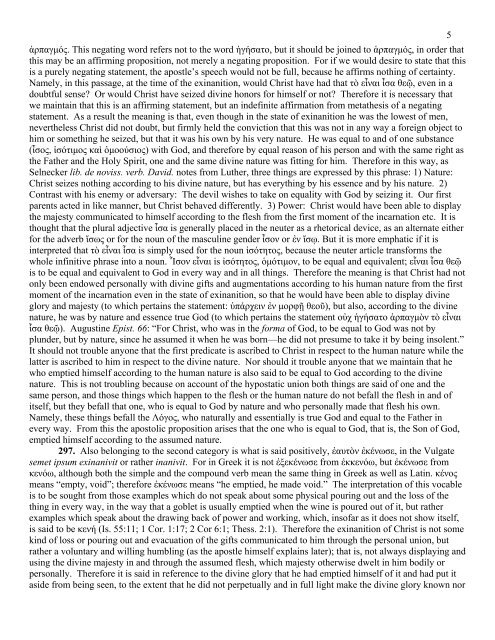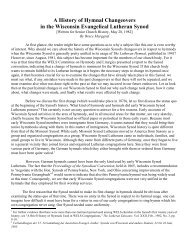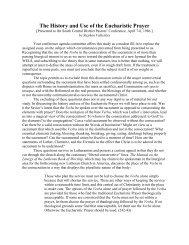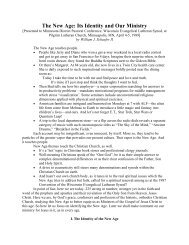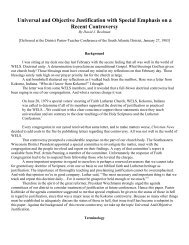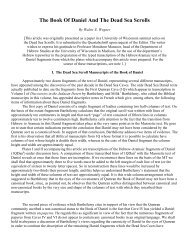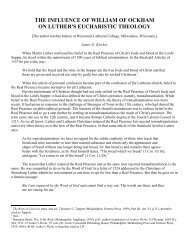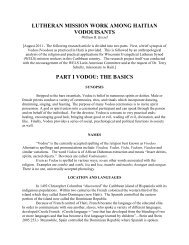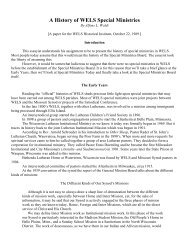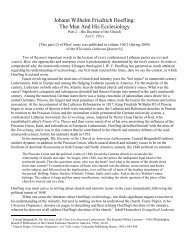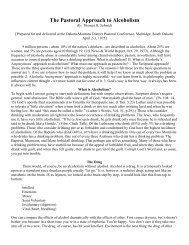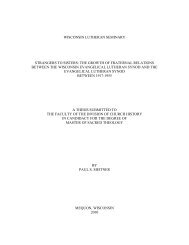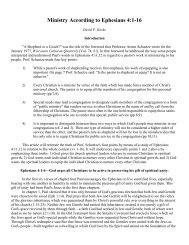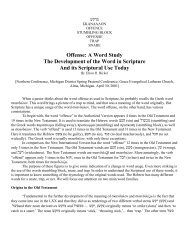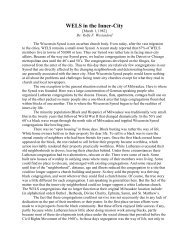Loci Theologici Loci Theologici
Loci Theologici Loci Theologici
Loci Theologici Loci Theologici
Create successful ePaper yourself
Turn your PDF publications into a flip-book with our unique Google optimized e-Paper software.
5<br />
ἁρπαγμός. This negating word refers not to the word ἡγήσατο, but it should be joined to ἁρπαγμός, in order that<br />
this may be an affirming proposition, not merely a negating proposition. For if we would desire to state that this<br />
is a purely negating statement, the apostle’s speech would not be full, because he affirms nothing of certainty.<br />
Namely, in this passage, at the time of the exinanition, would Christ have had that τὸ εἶναι ἶσα θεῷ, even in a<br />
doubtful sense? Or would Christ have seized divine honors for himself or not? Therefore it is necessary that<br />
we maintain that this is an affirming statement, but an indefinite affirmation from metathesis of a negating<br />
statement. As a result the meaning is that, even though in the state of exinanition he was the lowest of men,<br />
nevertheless Christ did not doubt, but firmly held the conviction that this was not in any way a foreign object to<br />
him or something he seized, but that it was his own by his very nature. He was equal to and of one substance<br />
(ἶσος, ἰσότιμος καὶ ὁμοούσιος) with God, and therefore by equal reason of his person and with the same right as<br />
the Father and the Holy Spirit, one and the same divine nature was fitting for him. Therefore in this way, as<br />
Selnecker lib. de noviss. verb. David. notes from Luther, three things are expressed by this phrase: 1) Nature:<br />
Christ seizes nothing according to his divine nature, but has everything by his essence and by his nature. 2)<br />
Contrast with his enemy or adversary: The devil wishes to take on equality with God by seizing it. Our first<br />
parents acted in like manner, but Christ behaved differently. 3) Power: Christ would have been able to display<br />
the majesty communicated to himself according to the flesh from the first moment of the incarnation etc. It is<br />
thought that the plural adjective ἶσα is generally placed in the neuter as a rhetorical device, as an alternate either<br />
for the adverb ἴσως or for the noun of the masculine gender ἶσον or ἐν ἴσῳ. But it is more emphatic if it is<br />
interpreted that τὸ εἶναι ἶσα is simply used for the noun ἰσότητος, because the neuter article transforms the<br />
whole infinitive phrase into a noun. Ἶσον εἶναι is ἰσότητος, ὁμότιμον, to be equal and equivalent; εἶναι ἶσα θεῷ<br />
is to be equal and equivalent to God in every way and in all things. Therefore the meaning is that Christ had not<br />
only been endowed personally with divine gifts and augmentations according to his human nature from the first<br />
moment of the incarnation even in the state of exinanition, so that he would have been able to display divine<br />
glory and majesty (to which pertains the statement: ὑπάρχειν ἐν μορφῇ θεοῦ), but also, according to the divine<br />
nature, he was by nature and essence true God (to which pertains the statement οὐχ ἡγήσατο ἁρπαγμὸν τὸ εἶναι<br />
ἶσα θεῷ). Augustine Epist. 66: “For Christ, who was in the forma of God, to be equal to God was not by<br />
plunder, but by nature, since he assumed it when he was born—he did not presume to take it by being insolent.”<br />
It should not trouble anyone that the first predicate is ascribed to Christ in respect to the human nature while the<br />
latter is ascribed to him in respect to the divine nature. Nor should it trouble anyone that we maintain that he<br />
who emptied himself according to the human nature is also said to be equal to God according to the divine<br />
nature. This is not troubling because on account of the hypostatic union both things are said of one and the<br />
same person, and those things which happen to the flesh or the human nature do not befall the flesh in and of<br />
itself, but they befall that one, who is equal to God by nature and who personally made that flesh his own.<br />
Namely, these things befall the Λόγος, who naturally and essentially is true God and equal to the Father in<br />
every way. From this the apostolic proposition arises that the one who is equal to God, that is, the Son of God,<br />
emptied himself according to the assumed nature.<br />
297. Also belonging to the second category is what is said positively, ἐαυτὸν ἐκένωσε, in the Vulgate<br />
semet ipsum exinanivit or rather inanivit. For in Greek it is not ἐξεκένωσε from ἐκκενόω, but ἐκένωσε from<br />
κενόω, although both the simple and the compound verb mean the same thing in Greek as well as Latin. κένος<br />
means “empty, void”; therefore ἐκένωσε means “he emptied, he made void.” The interpretation of this vocable<br />
is to be sought from those examples which do not speak about some physical pouring out and the loss of the<br />
thing in every way, in the way that a goblet is usually emptied when the wine is poured out of it, but rather<br />
examples which speak about the drawing back of power and working, which, insofar as it does not show itself,<br />
is said to be κενή (Is. 55:11; 1 Cor. 1:17; 2 Cor 6:1; Thess. 2:1). Therefore the exinanition of Christ is not some<br />
kind of loss or pouring out and evacuation of the gifts communicated to him through the personal union, but<br />
rather a voluntary and willing humbling (as the apostle himself explains later); that is, not always displaying and<br />
using the divine majesty in and through the assumed flesh, which majesty otherwise dwelt in him bodily or<br />
personally. Therefore it is said in reference to the divine glory that he had emptied himself of it and had put it<br />
aside from being seen, to the extent that he did not perpetually and in full light make the divine glory known nor


